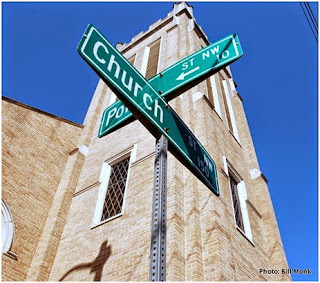I added for my fellow students this caveat, that this "in no way" meant to replace Scripture or Prayer Book with this one man's work, but only to "evoke some of the thoughts that will occur in tonight's reflections."
* * *
OPENING SENTENCES:
LEADER: (from an essay by Updike)
We know that we live and we know that we will die. We love the creation that upholds us and sense that is is good, yet pain and plague and destruction are everywhere.
PEOPLE: Our help is in the Name of the Lord, the Maker of heaven and earth.
HYMN: (from Updike's poem Midpoint)
(read responsively by half-verse)
An easy humanism walks the land;*
We choose to take an otherworldly stand.
The Truth arrives as if by telegraph:*
One dot; two dots; a silence; then a laugh.
Praise KIERKEGAARD, who splintered HEGEL's creed
Upon the rock of Existential need;*
Praise BARTH, who told how saving Faith can flow
From Terror's oscillating Yes and No.
Each passing moment masks a tender face;*
Nothing has had to be, but is by Grace.
Glory to the Father, and to the Son, and to the Holy Spirit;*
As it was in the beginning, is now, and will be forever. Amen
FIRST READING (from Updike's story "The Astronomer," to depict what Kierkegaard called "dread")
We ate dinner by the window, from which the Hudson appeared a massive rent opened in a tenuous web of light.... I felt the structure I had painstakingly built up within myself wasting away; my faith, my prayers, my churchgoing... all dwindled to the thinnest filaments of illusion, and in one flash, I knew, they would burn to nothing. I felt behind [the atheist's] eyes immensities of space and gas, seemed to see with him through my own evanescent body into gigantic systems of dead but furious matter, suns like match heads, planets like cinders, galaxies that were swirls of ash, and beyond them, more galaxies, and more, fleeing with sickening speed beyond the rim that our most powerful telescopes could reach.
I call myself Christian by defining a Christian as "a person willing to profess the Apostles' Creed...." I know no other combination of words that gives such life, that so seeks the crux. The Creed asks us not to believe in Satan but only in the Hell to which Christ descends. That Hell (in the sense at least of a profound and desolating absence) exists I do not doubt; the newspapers give its daily bulletins. And my sense of things, sentimental I fear, is that wherever a church spire is raised.... this Hell is opposed by a rumor of good news, by an irrational confirmation of the plenitude we feel is our birthright. The instinct that life is good is where natural theology begins.
PRAYERS from the Book of Common Prayer, pp. 385-6
CLOSING: (from Updike's novel A Month of Sundays)
To those who find no faith within themselves, I say no seed is so dry it does not hold the code of life within it...
We are found in a desert place
We are in God's palm
We are the apple of His eye.
Let us be grateful here, and here rejoice.
ALL: Amen.
[PHOTO: The bell tower of my church, St. James Episcopal, Marietta GA]

No comments:
Post a Comment